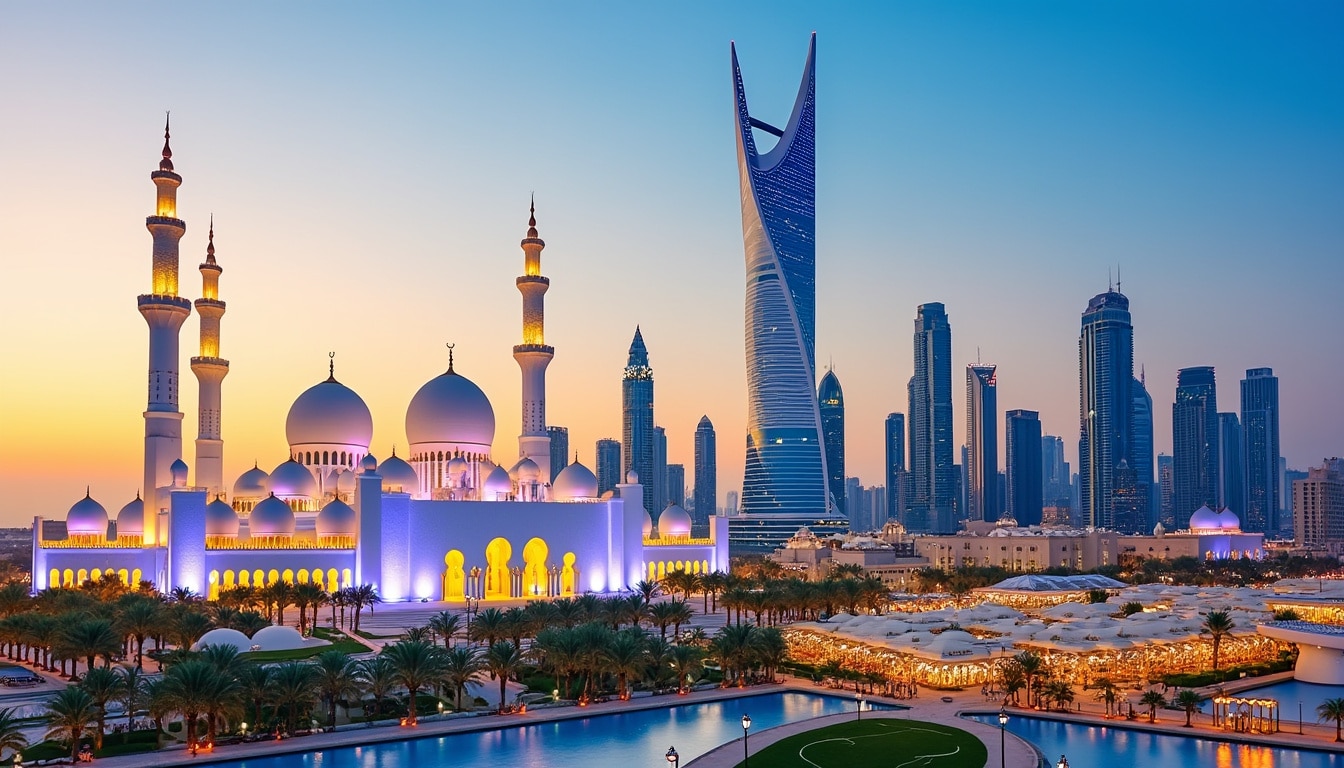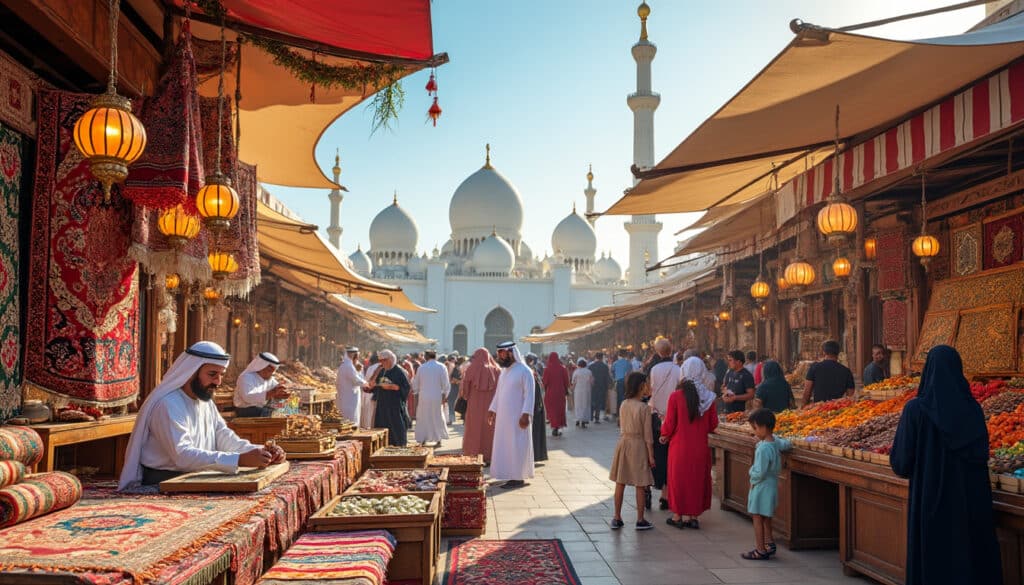Abu Dhabi, the capital of the United Arab Emirates, is a melting pot of cultures and languages. Its unique position as a global business hub, coupled with its diverse expatriate population, makes the linguistic landscape of Abu Dhabi incredibly vibrant. While Arabic is the official language across the UAE, a myriad of languages prevail in everyday interactions. This linguistic diversity is not only a testament to its cultural richness but also an essential aspect of its economic and social fabric. From the bustling markets to the corporate boardrooms and cosmopolitan social settings, understanding and speaking multiple languages is a vital asset in Abu Dhabi.
The Official Language: Arabic in Abu Dhabi
In Abu Dhabi, Arabic serves as the official language, forming the backbone of its cultural and political identity. Specifically, Modern Standard Arabic is widely taught in schools and used in governmental affairs, ensuring a unified linguistic foundation throughout the country. Emiratis predominantly speak a dialect known as Gulf Arabic, which closely resembles the dialects spoken in neighboring Gulf states such as Qatar, Kuwait, and Saudi Arabia.
The application of Arabic in Abu Dhabi is multifaceted. It is the medium of instruction in most educational institutions, especially those focusing on Islamic studies and cultural heritage. The language also plays a crucial role during religious ceremonies and rituals, reflecting its deep-seated connection to Islamic traditions. The UAE’s commitment to Arabic is evident in its efforts to preserve and promote it amidst the backdrop of globalization and multilingualism.
Despite the prominence of Arabic, non-native speakers frequently encounter it in formal contexts. Street signs, official documents, and public announcements predominantly utilize Arabic, providing an immersive experience for visitors and new residents. Nonetheless, for effective communication, many locals switch between Arabic and English, facilitating smoother interactions with the expatriate community.

The Role of Arabic in Cultural Identity
Arabic is intrinsic to the cultural identity of Abu Dhabi. It not only functions as a means of communication but also as a medium preserving the rich traditions and narratives of Emirati culture. Language plays a pivotal role in the oral storytelling practices that have been passed down through generations. These stories, infused with folklore and historical events, enrich the cultural tapestry of the region.
- 📚 Educational establishments emphasize Arabic literature and poetry.
- 🎤 Festivals and events often showcase Arabic calligraphy and recitals.
- 🎨 Arabic serves as a source of inspiration for local artists and artisans.
English: The Lingua Franca of Abu Dhabi
English holds a unique position in Abu Dhabi, functioning as the unofficial lingua franca. As the most widely spoken language among the expatriate community, English bridges the communication gap between individuals from varied linguistic backgrounds. From business negotiations to educational institutes and everyday social interactions, English is the preferred medium.
This prevalence stems primarily from Abu Dhabi’s rapid modernization and its emergence as a significant player in the global economy. Sectors like tourism, business, and healthcare predominantly operate in English, ensuring effective interactions among the city’s diverse population. The presence of numerous international schools further amplifies the language’s influence, making it accessible to a broader audience.
The adaptability of English has indeed revolutionized business operations in Abu Dhabi. Companies like Etisalat and Emirates Airline exemplify this shift by incorporating English into their marketing and customer service operations, thus appealing to an international clientele. Such linguistic versatility enhances the city’s attractiveness as a global business destination.
| Sector | Primary Language | Additional Languages |
|---|---|---|
| Business | English | Arabic, Hindi |
| Tourism | English | Arabic, Tagalog |
| Education | English | Arabic, French |
| Healthcare | English | Arabic, Urdu |
Learning Opportunities for English
Abu Dhabi offers myriad opportunities for learning English, catering to both native and non-native speakers. Language courses are widely available, ranging from academic programs to conversational classes aimed at improving everyday communication.
- 🏫 International schools offering English-oriented curricula.
- 🎓 Language institutes providing specialized courses for various proficiency levels.
- 💼 Corporate training programs emphasizing English communication skills.
Expatriate Languages: A Cultural Mosaic
Abu Dhabi’s expatriate community significantly contributes to the city’s cultural and linguistic diversity. This melting pot of cultures is reflected in the variety of languages spoken, including Hindi, Urdu, Tagalog, Malayalam, and many others. These languages accompany the thousands of expatriates who relocate to Abu Dhabi for work and better living standards.
Each language holds a unique position within the community, often reflecting the familial and regional origins of its speakers. In social gatherings, markets, and service sectors, the blend of these languages weaves a complex and fascinating tapestry of communication.
The Dominance of Asian Languages
Asian languages like Hindi and Urdu dominate the expatriate linguistic landscape due to the significant number of South Asian expatriates in Abu Dhabi. These languages are commonplace in neighborhoods predominantly inhabited by expatriates from India and Pakistan, such as in restaurants and local markets.
Moreover, the contributions of expatriates to sectors like construction, healthcare, and the service industry result in increased visibility of these languages. Their communities often establish cultural associations, providing platforms for celebrating linguistic and cultural heritage.
- 🇮🇳 Hindi and Urdu are widely spoken in social spaces and business settings.
- 🇵🇭 Tagalog is commonly heard in the hospitality and retail sectors.
- 🇧🇩 Bengali is spoken among the expatriate labor force.
The Influence of Global Languages and Emerging Trends
While Arabic and English hold prominence, other global languages significantly influence Abu Dhabi’s linguistic landscape. French, due to France’s strong diplomatic and commercial connections with the UAE, has a notable presence in select sectors. Additionally, languages like Chinese and Spanish are emerging, catering to the increasing number of tourists and business interactions from respective regions.
The growth of industries like tourism and trade has brought about new linguistic demands. Abu Dhabi Tourism initiatives have identified these needs, promoting multilingual capabilities within the sector to cater to an international audience. In particular, government and private sector collaborations aim to enhance language training and interpretation services.
| Emerging Language | Sector | Contributing Country/Region |
|---|---|---|
| French | Diplomacy, Education | France, North Africa |
| Chinese | Tourism, Business | China |
| Spanish | Trade, Tourism | Latin America, Spain |
Linguistic Innovation and Future Trends
With technological advancements, Abu Dhabi stands at the crossroads of a linguistic evolution. Companies like ADNOC and Mubadala are leveraging AI-driven translation tools to facilitate cross-cultural communication. Similarly, the hospitality industry, supported by entities such as the Abu Dhabi National Exhibitions Company, is adopting multilingual service platforms to enhance customer experiences.
The increasing demand for multilingual professionals highlights a burgeoning trend in language education and professional development. As Abu Dhabi continues to position itself as a global city, understanding the complex interplay of languages will remain crucial in navigating its cultural and economic landscape.
The Role of Cultural Events in Promoting Languages
Cultural events in Abu Dhabi serve as platforms for celebrating and promoting linguistic diversity. Events such as the Abu Dhabi Film Festival bring international filmmakers and audiences together, creating a space where languages intermingle and foster cultural understanding.
Such events provide not only entertainment but also an educational experience. They highlight the stories, histories, and identities intertwined with each language, enriching the city’s cultural narrative.
- 🎥 Film screenings and festivals celebrate linguistic and cultural diversity.
- 📅 Language workshops and seminars promote cross-cultural dialogue.
- 🎶 Music and art festivals showcase multilingual performances.
Organizations like the Al Ain Zoo and ADNOC Distribution also host events, emphasizing language’s role in education and conservation efforts. These initiatives reflect Abu Dhabi’s dedication to fostering a linguistically inclusive environment.
The Impact of Festivals on Language Preservation
Festivals play a critical role in preserving languages, especially minority dialects and indigenous languages at risk of fading away. They provide a platform for storytellers, artists, and cultural activists to share the narratives embedded within their languages, contributing to their revitalization and continuity.
As Abu Dhabi continues to welcome the world to its shores, these cultural events will remain integral in shaping its multilingual identity and promoting intercultural connections.
Frequently Asked Questions
| Question | Answer |
|---|---|
| What is the official language of Abu Dhabi? | Arabic is the official language of Abu Dhabi and the UAE. |
| Is English widely spoken in Abu Dhabi? | Yes, English is widely spoken, especially in business and tourism sectors. |
| What languages are spoken by expatriates in Abu Dhabi? | Expatriates in Abu Dhabi speak various languages, including Hindi, Urdu, Tagalog, and Malayalam. |
| Are there opportunities to learn languages in Abu Dhabi? | Yes, there are numerous language courses and learning opportunities available in Abu Dhabi. |
| How do cultural events impact language use in Abu Dhabi? | Cultural events promote and preserve linguistic diversity, fostering intercultural connections. |

Culture & Local Life in Abu Dhabi
Abu Dhabi, the capital of the United Arab Emirates, is a city that captivates with its blend of traditional Arab culture and cutting-edge modernity. In its transformation from a modest fishing village to a global metropolis, Abu Dhabi has maintained…

Best places to eat in Abu Dhabi
Abu Dhabi, a city known for its majestic architecture and rich cultural heritage, also offers a culinary adventure like no other. In 2025, the city stands out not just as a capital of the United Arab Emirates but as a…

Abu Dhabi, a city where tradition meets modernity, provides an exquisite culinary journey for anyone lucky enough to find themselves amidst its vibrant streets. Whether it’s the bustling atmosphere of a Middle Eastern bazaar or the serene elegance of fine…

Souvenirs and shopping in Abu Dhabi
Abu Dhabi, the capital of the United Arab Emirates, offers a unique blend of modern luxury and traditional charm. It stands as a splendid example of what happens when innovation meets cultural heritage. For travelers and residents alike, shopping in…

What do people eat in Abu Dhabi?
Abu Dhabi, a vibrant city in the heart of the United Arab Emirates, boasts a rich culinary scene that reflects a tapestry of cultures and traditions. From traditional Emirati dishes to international cuisines, the city’s food culture is as diverse…


